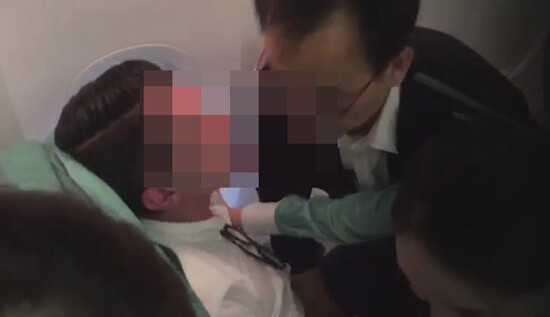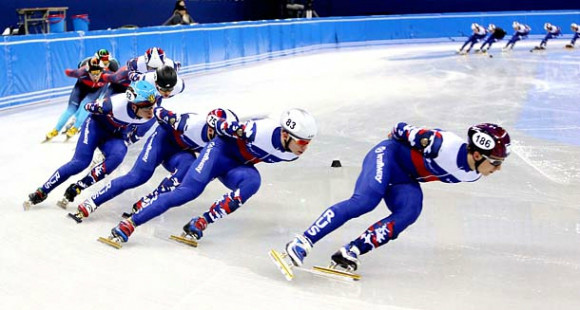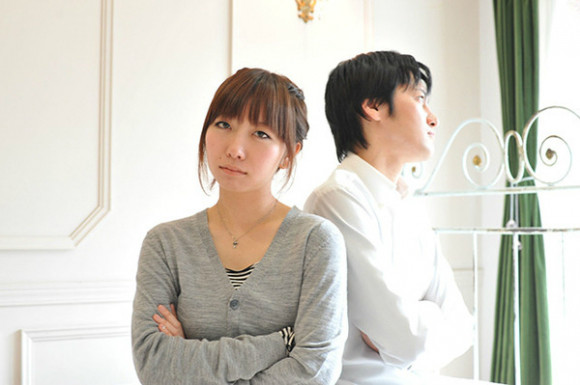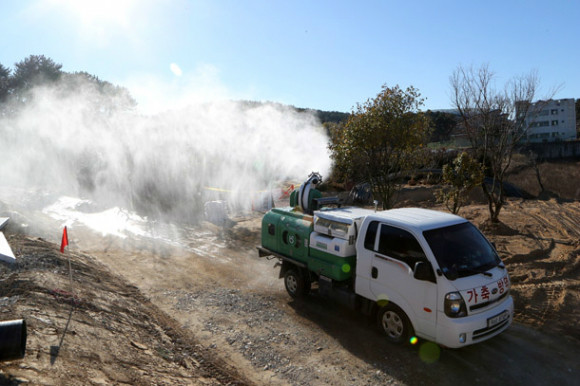いたい (痛い): 이타이 (아프다)
痛(いた)いところはありませんか。: 아픈 곳은 없습니까?
痛(いた)くないよ!: 아프지않아요!
心(こころ)が痛(いた)い。: 마음이 아프다.

'Study > Japanese' 카테고리의 다른 글
| やめる (辞める): 야메루 (그만두다) (0) | 2016.12.26 |
|---|---|
| やく (焼く): 야쿠 (굽다) (0) | 2016.12.23 |
| ゆるす (許す): 유루스 (용서하다) (0) | 2016.12.22 |
| にらむ (睨む): 니라무 (쏘아보다 / 노려보다) (0) | 2016.12.21 |
| たたかう (戦う): 타타카우 (싸우다) (0) | 2016.12.20 |
Belligerent passenger ignores summons
The violent intoxicated passenger who attacked passengers and crew members on a Korean Air flight from Hanoi to Seoul is evading police summons, and there is brewing skepticism that he may get away with only a slap on the wrist. The passenger, a 34-year-old Korean man surnamed Yim who was seated in prestige class (business class), struck another passenger and attacked cabin crew who tried to restrain him. Immediately after arrival in Korea, Yim was taken into custody by Incheon International Airport Police but was released late Tuesday because he was too drunk to respond to questions, and police said they would summon him when he was sober. Police notified Yim to appear for questioning on Thursday but Yim said he would make a decision to appear after consulting with his lawyer. A police official said they notified Yim that “because public sentiment is not good, appear for investigation today [Thursday],” or by 1 p.m. on Friday at the latest. “After appointing a lawyer and discussing things with him,” Yim replied, “then I will appear for questioning.”
Yim was said to have boarded the plane already intoxicated and consumed two and a half glasses of whisky inflight. He works for his father’s trading company and was returning from a business trip to Vietnam. Police said Yim kept trying to make conversation with a 56-year-old passenger next to him, who tried to ignore him. Yim eventually got angry and struck the passenger. American Grammy-winning pop singer Richard Marx and his wife Daisy Fuentes, a former MTV VJ, were also aboard the flight, sitting in the row beside Yim in business class. Marx stepped in to help subdue Yim and the couple took photos and videos of the fiasco and shared it over social media, garnering international attention. The process of binding Yim with a rope, in accordance with airline protocol, took an estimated hour. A three-minute video of the scene that has been circulating on the internet shows Yim resisting being tied down by the flight attendants, shouting profanities and spitting in the face of cabin crew. In addition to this recording, police are in the process of reviewing three other videos clips and said they will also look into whether Yim was on drugs. But police said when they handed over custody of Yim after he was restrained by cabin crew, they did not observe any needle marks on his arms. “In order to conduct a urine test, we would need the consent of the person in question,” a police official said.
There has been criticism over social media that Yim is another example of someone born with a silver spoon in his mouth, benefitting from his father’s wealth and seemingly above the law. “The victims have submitted their medical reports,” the police official said, “and after investigating Yim as a suspect, we will review whether to issue an arrest warrant for him.” Charges of assault can be punished by up to two years and fined up to 5 million won ($4,200). But charges of bodily harm can result in up to seven years in prison and a fine of 10 million won. Between 2012 and June, there were 1,506 reported cases of verbal and physical assault, harassment, smoking and other misdemeanors aboard aircraft, according to the Ministry of Land, Infrastructure and Transport. The number has steadily been increasing over the past four years, with 191 cases in 2012, 203 in 2013 and 354 in 2014. There was a 30 percent increase in misdemeanors on aircraft in 2015, bringing the number to 460 cases. And through June there were 298 cases. Last year, the most common form of misconduct was smoking inflight, with 381 reported cases. Fifteen were cases of sexual harassment, 42 were instances of rowdiness, nine were cases of disorderly behavior resulting from drinking and six included threatening behavior and assault.
Punishment has been light thus far. Incheon International Airport Police, for example, issued an arrest warrant for only one person for inflight misconduct in September 2014. Under Korean law, one can face up to five years in prison for obstruction of the duties of flight crew and violating aircraft safety laws. But most people get away with a fine of less than 5 million won. Last year, singer Bobby Kim was slapped with a 4 million won fine under Korean law for harassing a female flight attendant inflight. Kim, who said he had consumed six glasses of liquor, tried to embrace the flight attendant on a flight bound to San Francisco from Incheon.

'Study > English' 카테고리의 다른 글
| Gangneung Ice Arena is ready to go and looking good (0) | 2016.12.26 |
|---|---|
| Top diplomat defector will take a public role in the South (0) | 2016.12.23 |
| Avian flu outbreak reaches Korea’s duck center (0) | 2016.12.22 |
| Korean diplomat in Chile caught sexually harassing underage girls (0) | 2016.12.21 |
| New electricity pricing goes into effect (0) | 2016.12.20 |
やめる (辞める): 야메루 (그만두다)
会社(かいしゃ)を辞(や)めたい。: 회사를 그만두고 싶다.
辞(や)めるときは慎重(しんちょう)に。: 그만둘 때는 신중하게.
来月(らいげつ)辞(や)めるつもりだ。: 다음 달 그만 둘 생각이다.

'Study > Japanese' 카테고리의 다른 글
| いたい (痛い): 이타이 (아프다) (0) | 2016.12.27 |
|---|---|
| やく (焼く): 야쿠 (굽다) (0) | 2016.12.23 |
| ゆるす (許す): 유루스 (용서하다) (0) | 2016.12.22 |
| にらむ (睨む): 니라무 (쏘아보다 / 노려보다) (0) | 2016.12.21 |
| たたかう (戦う): 타타카우 (싸우다) (0) | 2016.12.20 |
Gangneung Ice Arena is ready to go and looking good
The Gangneung Ice Arena opened in Gangwon on Wednesday with new improvements in safety, ensuring its readiness for the short track speed skating and figure skating events at the 2018 PyeongChang Winter Olympics. Construction for the ice rink started in June 2014 and took two years and six months to complete. Coinciding with the grand opening, there will be an Olympic test event. Beginning from today, the fourth round of the 2016-17 International Skating Union (ISU) Short Track World Cup will begin.
The ISU Four Continents Figure Skating Championship will be held from Jan. 16 to 19. Prior to the Olympics, the configurations for the short track and figure skating events will both be optimized. The South Korean Men and Women’s Short Track Speed Skating Competition opened earlier at the Gangneung Ice Arena on Nov. 20 as a trial run. Even before the rink opened, praise poured in, especially for the 90-centimeter (35-inch) thick pliant safety fences that protect competitors should they bump into each other or tumble while rounding a corner. These are safer than the rigid fences at Taereung Ice Rink or Mokdong Ice Rink. Viktor Ahn, the Korean-born Russian short track gold medalist, crashed into a fence injuring his left knee while training at Taereung in 2008 and underwent a year of rehabilitation. But 10 or so athletes fell during the National Men and Women’s Short Track Speed Skating Competition at Gangneung Ice Arena and none suffered a major injury. “By virtue of the safer fence, a bolder race was possible,” said last season’s men’s short track representative, Park Ji-won. The cutting-edge facility is also the first Korean ice rink to maintain a temperature of 15 degrees Celsius (59 degrees Fahrenheit) in the stands.
Some athletes were even spotted wearing short-sleeved shirts at the speed skating competition. Three hundred vents warm the seats, leaving the ice untouched. This is especially impressive considering the temperatures at which the ice must be kept. The ice must be slighter warmer - minus 4 degrees Celsius (24.8 degrees Fahrenheit) - and therefore softer for figure skating, whereas colder - minus 7 degrees Celsius (19.4 degrees Fahrenheit) - and harder ice is better suited to short track, as it enhances speed. The challenge of going from one to the other was evident at the 2014 Sochi Olympics in Russia. During the women’s short track event at the Iceberg Skating Palace, Park Seung-hui fell twice in the 500m final. “The surface of the ice was pock-marked everywhere,” said Park. “The ice quality wasn’t good.” In the men’s single figure skating event, gold medalist Yuzuru Hanyu and silver medalist Patrick Chan also fell. The challenge comes because, after the figure skating matches conclude, the ice must be prepared in three hours for the short track events.
“It is difficult to change the ice quality in just a few hours,” said gold medalist Ko Gi-hyun, who is now the general facilities manager at Gangneung. “The ice for racing and performance events is different. The camera positions, fences and other things must be changed.” “To adjust the ice temperature, a day or more is necessary,” said Bae Ki-tae, technical director of ICE n SPORTS. “Unlike at Sochi, figure skating will be held in the morning with short track in the afternoon. Fortunately, it’s easier to freeze ice than to melt it.” To do this, three 150RT (refrigeration tonnage) coolers were installed. So far, however, the facility appears to be shipshape. According to Jin Seon-yoo, 3-time gold medalist at the 2006 Torino Winter Olympics, “The stadium suits the players needs down to the finest detail.”

'Study > English' 카테고리의 다른 글
| Belligerent passenger ignores summons (0) | 2016.12.27 |
|---|---|
| Top diplomat defector will take a public role in the South (0) | 2016.12.23 |
| Avian flu outbreak reaches Korea’s duck center (0) | 2016.12.22 |
| Korean diplomat in Chile caught sexually harassing underage girls (0) | 2016.12.21 |
| New electricity pricing goes into effect (0) | 2016.12.20 |
やく (焼く): 야쿠 (굽다)
魚(さかな)を焼(や)いて。: 생선을 구워.
焼(や)き具合(ぐあい)によって味(あじ)が変(か)わる。: 구운 정도에 따라 맛이 달라진다.
焼(や)かないで、生(なま)で食(た)べましょう。: 굽지 말고, 날것으로 먹자.

'Study > Japanese' 카테고리의 다른 글
| いたい (痛い): 이타이 (아프다) (0) | 2016.12.27 |
|---|---|
| やめる (辞める): 야메루 (그만두다) (0) | 2016.12.26 |
| ゆるす (許す): 유루스 (용서하다) (0) | 2016.12.22 |
| にらむ (睨む): 니라무 (쏘아보다 / 노려보다) (0) | 2016.12.21 |
| たたかう (戦う): 타타카우 (싸우다) (0) | 2016.12.20 |
Top diplomat defector will take a public role in the South
Thae Yong-ho, the senior North Korean diplomat who defected to the South with his family in August, will begin public activities starting Friday. The former deputy ambassador in London says he wants to dedicate his life to reunification. “Rather than seeking personal success, I want to dedicate my life to enabling a quicker unification - the hope of our people - so that the North Korean people can be freed from oppression and persecution,” Thae was quoted as saying to a group of lawmakers Monday. Various government sources Tuesday say that Thae, the most senior North Korean diplomat to ever defect, is expected to work as a researcher of North Korea affairs at a state institute affiliated with the National Intelligence Service (NIS). He is expected to remain in the public eye, unlike other senior North Korean defectors who remain private. That could bring risks to his personal safety.
Rep. Lee Cheol-woo, chair of the National Assembly’s intelligence committee, held a three-hour close-door meeting with Thae in Seoul on Monday with a bipartisan group of lawmakers on the committee. After the meeting, Lee told reporters that Thae had said that the higher the rank of North Korean officials, the more stringent the surveillance on them. He said it was commonplace for their residences to be bugged. Thae said that Hyon Yong-chol, North Korea’s former defense chief, was executed because of something he said in his own house. Hyon didn’t know his home was bugged, Thae said. In May 2015, the NIS revealed that former North Korea Defense Minister Hyon, a four-star general, had been executed the previous month, accused of treason and disloyalty to the North Korean leader. Describing his own fleeing of the United Kingdom last July, Thae said he felt “disillusioned” by North Korean leader Kim Jong-un’s reign of terror and wanted to save his sons from a life of “slavery.”
After spending many years abroad, Thae learned about South Korea’s democracy and economic development through movies and dramas. A longing for a liberal democratic system grew within him, and he decided to defect. “As he realized the wretched reality of North Koreans’ slavery under Kim Jong-un’s reign of terror and oppression, his disillusionment with the system grew, and he decided to defect,” Lee said. “At the time of defection, he told his sons: ‘From this point on, I will break the chain of slavery.’ And after arriving here, he felt regret for not having the courage to defect earlier.” Lee quoted Thae as saying, “Kim Jong-un is still young, so if his rule continues for decades, there will be many senior officials who suffer from depression thinking that their children and grandchildren will be subjugated to a life of slavery.” Thae was also said to have pointed out that he believes that without Kim Jong-un, the regime would completely collapse because “there is no second-in-charge.” The North Korean elite, Thae conveyed, are feigning loyalty to Kim Jong-un and are afraid of what will happen to them if the North Korean system collapses. Thae said he worries that if there is political upheaval in North Korea, the Pyongyang elite will flee to China, not South Korea. He hopes South Korea’s laws and system change to show the North Korean elite that they can lead regular lives here. He said more North Korean elites would try to defect to the South if they can be assured of decent jobs here.
The former No. 2 diplomat in London fled the embassy in mid-July and arrived in South Korea in August with his wife and two sons. He also clarified previous reports that his daughter was not able to defect with the family, saying he only has two sons. Since his arrival in Seoul, Thae has been cooperating in an investigation led by the NIS and is set to be released Friday, when the probe comes to an end. Thae also denied the North Korean government’s accusations that he had fled because he was afraid of punishment for crimes such as embezzlement. He said that because he expected Pyongyang to make such accusations, he had balanced accounts at the embassy in London before his defection and taken pictures of accounts and receipts as evidence.

'Study > English' 카테고리의 다른 글
| Belligerent passenger ignores summons (0) | 2016.12.27 |
|---|---|
| Gangneung Ice Arena is ready to go and looking good (0) | 2016.12.26 |
| Avian flu outbreak reaches Korea’s duck center (0) | 2016.12.22 |
| Korean diplomat in Chile caught sexually harassing underage girls (0) | 2016.12.21 |
| New electricity pricing goes into effect (0) | 2016.12.20 |
ゆるす (許す): 유루스 (용서하다)
許(ゆる)してください。: 용서해 주세요.
どうしても許(ゆる)せない。: 아무리 생각해도 용서할 수 없다.
心(こころ)を許(ゆる)す。: 마음을 열다.

'Study > Japanese' 카테고리의 다른 글
| やめる (辞める): 야메루 (그만두다) (0) | 2016.12.26 |
|---|---|
| やく (焼く): 야쿠 (굽다) (0) | 2016.12.23 |
| にらむ (睨む): 니라무 (쏘아보다 / 노려보다) (0) | 2016.12.21 |
| たたかう (戦う): 타타카우 (싸우다) (0) | 2016.12.20 |
| うたがう (疑う): 의심하다 (우타가우) (0) | 2016.12.19 |
Avian flu outbreak reaches Korea’s duck center
A highly pathogenic strain of avian influenza has now infected Naju in South Jeolla, home to Korea’s largest population of ducks, and in the past few days spiked in 14 areas in Jeongeup in North Jeolla. After a duck farm in Jongo-ri of Naju, South Jeolla, was determined to have been infected with the H5N6 avian influenza, the virus was found within a week on another duck farm just 1 kilometer (0.6 mile) away, according to the Naju city government on Friday. Naju is home to 1.51 million ducks, the largest number in Korea. Health authorities have culled 17,400 ducks at the Jongo-ri farm, and are planning to cull another 228,000 ducks being raised within a 3-kilometer area around the farm. The provincial government of South Jeolla is denying transmission from the first farm to the second. “The two farms share a mountain between them,” said a spokesman of the provincial government, “and there has been no movement of eggs or baby ducks between them.”
Within South Jeolla, avian influenza was detected in three areas in Naju, one in Haenam County, one in Muan County and another in Jangseong County. A total of 209,000 ducks and chickens have been culled in South Jeolla. At Jeongeup in North Jeolla, the disease was found 14 times in 12 days, spreading at an alarming speed. “Health authorities culled 8,000 chickens at a farm in Jeongeup on Thursday, after a strain of the H5N6 avian influenza virus was detected,” said the North Jeolla provincial government in a statement. The farm is only 1.3 kilometers from another in the city where the disease was found 12 days ago. “Health authorities are conducting epidemiological surveys on the outbreaks,” said an official of the livestock department of the North Jeolla provincial government.
There have been 14 confirmed outbreaks in North Jeolla; 10 in Jeongeup, one in Gimje, one in Gochang County and two in Booan County. Health authorities are still testing the virus strains found in five more areas in North Jeolla, four of which are in Jeongeup. As of Friday, a total of 517,000 chickens and ducks at 36 farms in the province have been culled. “The ministry decided to raise the national aviation influenza crisis level to the highest level in its four-tier system,” said Kim Jae-soo, minister of agriculture, food and rural affairs, in a press briefing Friday. “The H5N6 avian influenza is spreading more rapidly than the H5N8 avian influenza in 2014.”
The Korea Centers for Disease Control and Protection said it will continue to vaccinate 6,779 farmers and health authorities doing sterilizing and culling jobs, who are the people at the highest risk of getting infected. The ministry said the virus can spread via feces of infected chickens and ducks to people, but that the possibility is low and that no person in Korea has been found infected with the H5N6 avian influenza. The H5N6 avian influenza virus appeared in Korea one month ago and has caused the largest amount of damage the domestic poultry industry has ever experienced from bird flu. More than 284 farms have been hit and some 16 million ducks, chickens and quails culled.

'Study > English' 카테고리의 다른 글
| Gangneung Ice Arena is ready to go and looking good (0) | 2016.12.26 |
|---|---|
| Top diplomat defector will take a public role in the South (0) | 2016.12.23 |
| Korean diplomat in Chile caught sexually harassing underage girls (0) | 2016.12.21 |
| New electricity pricing goes into effect (0) | 2016.12.20 |
| Korean students’ scores take tumble on PISA assessment (0) | 2016.12.16 |
にらむ (睨む): 니라무 (쏘아보다 / 노려보다)
睨(にら)まないで!: 노려보지 마.
睨(にら)みすぎて目(め)が痛(いた)い。: 너무 노려봐서 눈이 아프다.
彼女(かのじょ)は睨(にら)みっぱなしでいる。: 그녀는 계속 노려보고 있다.

'Study > Japanese' 카테고리의 다른 글
| やく (焼く): 야쿠 (굽다) (0) | 2016.12.23 |
|---|---|
| ゆるす (許す): 유루스 (용서하다) (0) | 2016.12.22 |
| たたかう (戦う): 타타카우 (싸우다) (0) | 2016.12.20 |
| うたがう (疑う): 의심하다 (우타가우) (0) | 2016.12.19 |
| おちつく (落ち着く): 오치츠쿠 (자리잡다 / 정착하다) (0) | 2016.12.16 |
Korean diplomat in Chile caught sexually harassing underage girls
A Korean diplomat based in Chile is in hot water after being caught on camera sexually harassing an underage local girl. He has since been recalled from his post and is likely to face criminal proceedings should he be found guilty, according to the Korean Ministry of Foreign Affairs, which emphasized through a statement Monday a “zero-tolerance principle” toward sexual harassment.
On Sunday, a Chilean TV show “En Su Propia Trampa,” or “In his own trap,” aired, exposing an official surnamed Park with the Korean Embassy in Chile making advances on a teenage school girl. A preview clip of the show has gone viral on Facebook and other social media platforms over the weekend, and the official’s actions have caused a backlash locally and in Korea, as well. The diplomat is seen in the video sitting on a park bench, caressing a female student’s neck and asking if he can kiss her. Park is seen asking the girl if she wants to become his “special friend” or “lover” as he strokes her leg. He is also seen in the doorway of a room, pulling her arm to force her inside as she begs him, “please, please.” When the host of the show later informs Park that he was caught on tape, that what he has done to an underage girl is a crime both in Chile and in Korea and that Park’s actions will be reported to the police, the diplomat says he will not meet with minors anymore and begs not to be reported to the police, saying, “please, please.”
The documentary program producers began shadowing Park after receiving a tip that the official had sexually harassed an underage local female student he was teaching Korean language to back in September. The producers hired a 20-year-old woman to pose as a 13-year-old student and approach Park. They communicated over Facebook and met at a park. The program describes Park as being responsible for the promotion of Korean culture, such as K-pop, to Chilean youth. The parents of the original girl who tipped off police about Park also appear on the show, expressing sorrow at what their daughter faced. The girl reported the harassment to Chilean police. The Korean Ministry of Foreign Affairs revealed last week that a diplomat in South America faces charges of sexually harassing local minors. A Foreign Ministry official elaborated that the diplomat, who taught Korean at a local school, faces charges of sexually assaulting a 14-year-old female student on campus in September.
Despite the recalled official having diplomatic immunity, the ministry here said it plans to cooperate with Chilean police in the investigation process. Korean Foreign Minister Yun Byung-se was reported to have said at a meeting of senior officials Monday that the situation was one that “should not be tolerated” and called for “disciplinary actions certainly, and, if necessary, criminal proceedings.”

'Study > English' 카테고리의 다른 글
| Top diplomat defector will take a public role in the South (0) | 2016.12.23 |
|---|---|
| Avian flu outbreak reaches Korea’s duck center (0) | 2016.12.22 |
| New electricity pricing goes into effect (0) | 2016.12.20 |
| Korean students’ scores take tumble on PISA assessment (0) | 2016.12.16 |
| Korean auto exports rebound after 13 months of declines (0) | 2016.12.15 |
